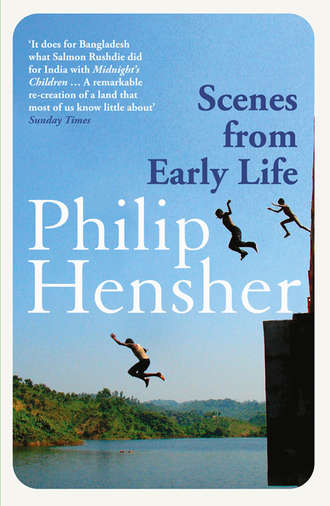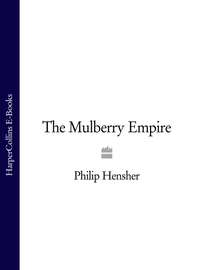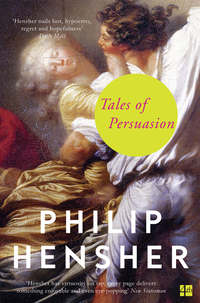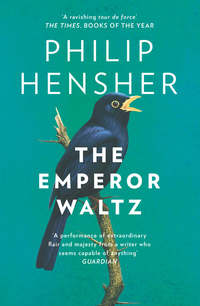
Полная версия
Scenes from Early Life
These were Nadira’s music teachers. They were not very well paid, and the trousers, long shirt and sandals that the shorter of the two wore were the only clothes I ever saw him in. They were soft and worn, and, if you looked closely, frayed at cuff and hem. All the same, they were both very clean – the short one very strikingly so, his white shirt brilliant in the sunlight from as far away as the corner of the street. I think he washed his shirt every night, pummelling away with soap and water and a stone, hanging it up to dry until the morning. He was the player of tabla. His colleague played the harmonium while Nadira sang. You could not help but think, as they hurried towards Nana’s house, talking quietly and with a professorial air of respect to each other, that they were glad to be coming to teach her. And this was true. They were glad.
I was permitted to sit in on Nadira’s lessons. She was a beautiful singer, and the two instrumentalists took more instruction from her than the other way round. She sang songs by Tagore, and more recent songs about the countryside in Bangladesh, too; they accompanied her on the fluting harmonium, the pattering little song of the tabla and if you looked out of the window, you could see that even the gardener was slowing his work and listening. The tabla player would often ask me to fetch him a glass of water before he began, and as a reward would let me try to play on his small tuned drums, to fetch a melody from them. But I never could, and quickly started to bang on them with my fists. Nadira would never put up with that. ‘You’re making a horrible noise. You can leave, or you can sit on the sofa and listen.’ The harmonium player would never invite me to play on his instrument, with its odd flapping front; balding, tall and serious, he made no effort to befriend small boys. He would never say ‘Chota-sahib’ to a child, and I utterly respected him for it.
They would stay for two hours, accompanying Nadira. They would perform five or six songs. First they would play one through, then return and repeat a section. This was very dull. I would have preferred it if they had just performed their six songs, and then gone away, like a concert. But I understood that they had to practise. My aunt had the loveliest voice I ever heard, and she sang Bengali songs, by Nazrul as well as Tagore. She was quite a different person in these lessons, humble, respectful; she took comments and advice from the two musicians very easily. They seemed more like honoured guests in our house than people who were paid to teach my aunt. I always hoped that they would sing the song about the flower. It was my favourite.
The flower says,
‘Blessed am I,
Blessed am I
On the earth . . .’
The flower says,
‘I was born from the dust,
Kindly, kindly,
Let me forget it,
Let me forget it,
Let me forget.
There is nothing of dust inside me,
There is no dust inside me,’
So says the flower.
They would come to the end of their two hours. Once I had settled, I could listen very happily for all that time, so long as there was more playing than rehearsing, as I thought of it. Nadira would offer them a cup of tea, or a glass of water, and they would accept. If there were other people in the house, at this point they came to greet them. My family knew and respected both of the musicians, from many years back, and so did Khandekar-nana’s family. The tall musician would give an imperceptible sign to the short tabla player. They would get up and go. That was the end of their lesson. The whole family came to the door to say goodbye to them.
2.
In 1965 Altaf Ali was twenty-nine years old, and Amit Mukhopadhyay was twenty-eight. They shared a flat in a block owned by Mrs Khandekar, the wife of my grandfather’s best friend.
They had met in the following way. The radio station in Dacca held concerts of Bengali music every Saturday night. The programme was very popular, and had resisted all attempts so far to remove it from the air. A large roster of Dacca musicians supplied the regular basis of the listeners’ pleasure. It was not always possible for musicians to play, however, in established pairings and groupings. Listeners would find their admired musicians combining in unfamiliar and unprecedented ways. This was one of the appealing things of the programme: the sense, like Bengali street life, that you never knew who you might hear talking together.
Sometimes a sitar player would arrive without his regular partner on tabla. Sometimes a tabla player would say he had no idea what had happened to a harmonium player. Musicians are not the most reliable class of people, and if at worst they could be drunkards and gamblers by inclination, at best they were always open to a better offer from others. When a musician failed to turn up at the recording studio, he had often been offered a well-paid job at the wedding of a rich man’s daughter. The radio programme commanded a large audience. But it could not compete with the fees possible when accompanying a famous singer at a lavish Dacca wedding. The producers understood this. They were always ready to match up instrumentalists and singers who had only a small acquaintance. The musicians were ready, in their turn, not to make difficulties about this, although in practice the performances that were broadcast sometimes came close to catastrophe.
Altaf and Amit met each other in just such a way. Altaf was expecting to see the same tabla player he had been playing with for the previous three years. But the producer came into the musicians’ room – a crowded, cramped room in the old British barracks that the radio station used. (The recording studio next door had its windows muffled with blankets and the door reinforced; still, some noises and voices of the city tended to seep into the programmes that were broadcast.) He hailed Altaf, and looked about the room. ‘This is Amit Mukhopadhyay,’ he said wildly. He was always in a hurry, referring frequently to the big black-bound book in which the logistical details of bookings and commitments were entered. ‘He’ll be playing with you today.’ Then the producer disappeared, without once looking up from the bound volume, or even over the top of his half-moon glasses.
Altaf had not noticed the man. Now he looked at him: he was short but well turned out. His shirt and trousers were very clean, and his hair was neatly brushed, with a tidy parting that drew a white line on his scalp. His face gave the impression of liveliness, without actually engaging to the point of saying anything. Altaf greeted him; the short man greeted him back. They quickly discussed the music. Altaf explained the mode he would be using, and two or three other details about how he liked things to begin, and how to conclude. If the tabla player was good, that would be enough for him. It was all a matter of quick-wittedness, improvisation and response. A bad musician simply played. A good one listened as he played. A very good one would anticipate.
Sometimes a new friend slips into your life unobtrusively, as if you have been walking quietly along when out from a doorway steps a familiar easy presence. He makes a brief remark in greeting, and falls companionably into the rhythm of your stride, so that you hardly remember what it was like to walk alone. So it was with Altaf and Amit. Once they were in the studio, and they started to play the evening song, with Altaf leading, they were attuned to and easy in each other’s musical company. There were none of those false starts and assertive blunders that unfamiliar pairings often made, and practised musicians knew how to conceal. Instead, there was a considerate listening presence. Amit’s playing was, as it were, full of himself: not in a bumptious or assertive way, just as an egg holds meat. It was simply full of a strong flavour, which was Amit’s personality. His playing was free and lucid, complicated, but easy and interesting to follow. There was now a little hesitation, like the lyric breath at the brink of a sneeze, as Amit hung fire before plunging into a decisive monsoon-patter; then there was a rapturous run between tones, without hesitation. All the time Amit’s playing was full of pensive thought and possibility. Altaf felt that those pauses and falterings, like a bird cocking its head and waiting between flourishes of flight, came from Amit’s listening to Altaf’s harmonium. A musician as good as Amit would have been as good with most competent partners. But Altaf could not help taking their broadcast that afternoon as a compliment. And performing to the ear of so good and attentive a partner, Altaf could hear his own musical lines grow more flexible, inward and fantastic. He could not imagine, after ten minutes, how he had ever endured such a thudding banger as Mohammed, his usual partner, which, apparently, he had done week after week until now. After the recording, Amit was flushed and cheerful, although not much more talkative. They found themselves walking in the same direction.
3.
Altaf had five younger brothers still living at home. He had to share a bedroom with the thirteen-year-old and the seven-year-old. He could not remember ever having had a room of his own, although when he was born, for the three years when he was not just the eldest but the only one, he must have lived in such a way. Now, the bedroom had to serve for everything – not just for his brothers’ homework, which they did kneeling on the floor before an old gateleg table intended to support a teacup or two, but his harmonium practice, too. He kept his instrument on a high shelf where his brothers could not get at it. His brothers regarded his harmonium as a toy, and not as the tool of his trade. He practised when they were at school, and put it away out of reach before their return. Every Saturday, he polished the rosewood case with beeswax. He believed it improved the tone.
There was no point in remonstrances with his mother and father. There was no more space in the house to be had. He supposed that he would find a place of his own when he married. But he was poor and did not have the means to marry, and wives expected children, so there would not be any time in which he could live and play in peace. Altaf accepted all of this.
Amit had come to Dacca from Chittagong to play the tabla. He had no other skills. He did not want to do anything else. He did not come from a rich family. (That was how he put it, walking along with Altaf, another recording session over.) But he was making some headway for himself and would progress in life, he believed. He taught, during the week, in a boys’ school, an hour’s bus ride away from where he lived in a quiet way with an old Dacca aunt of his father’s, a widow. There was not enough work to allow him to teach the boys music only; he had to teach them the rudiments of Bengali poetry, too. That was no hardship. The boys were good, intelligent and lively. He sometimes found it hard to keep discipline. Once, an older master who was conducting a class next door had stepped in to ask what the meaning of the unholy bedlam could possibly be.
(Amit, without making any obvious effort, was a good mimic. Altaf laughed at the vividness of the impression, though he did not know the man.)
That had not been pleasant, Amit went on. And naturally, afterwards, the boys had been still harder to keep under control. But it was a good school, and Amit had been lucky to be taken on as a junior master, teaching the boys music and poetry. He taught them to sing Bengali songs, often famous songs by Atulprasad, Tagore and Nazrul, and talked to them about other poets and writers of Bengal. They read the work of these writers together. When the boys were interested and quietened down to listen, they were good students. Amit considered himself very lucky to be able to teach in such a good school, yes he did, and he did not think the daily journey too much. There were neighbours of his aunt who travelled two or three hours every day to go to their place of work. And the other masters were reasonable people.
They stopped at a pavement sandesh-seller; the sweets were all of the same stuff, but shaped in different ways. Some people had their favourite shapes. Altaf did not, but now, talking to Amit, he found himself hovering, unable to decide which shape of sandesh they would settle on and share.
Amit reached the end of his account of his circumstances, and ate a sweet. He had one of those faces which, in movement or in conversation – even when he was working up to saying something – looked open, innocent and trusting. When he sank deep into thought, it looked quite different; it could take on a furrowed, even rather angry appearance. Altaf had known him for almost a year before he realized that the positive way in which he spoke about his circumstances did not reflect an optimistic personality. Instead, Amit spoke well of his bestial pupils and insulting colleagues because he did not trust anyone. He believed that a bad word might get back, and he spoke guardedly, even to Altaf. When he stopped speaking, his face grew dark; he looked on the verge of shouting in rage. And then he ate his sweet with open, boyish enjoyment, and looked quite trusting again.
Altaf was from a Muslim family; Amit was a Hindu. His aunt had a small corner in her flat devoted to some of her gods. Altaf believed that this trait of Amit’s – his inability to trust people, or think that anything was for the best in the end – came ultimately from his family’s religion. He did not say so.
It was hard for Amit to be honest when things had gone wrong in his life. His problems with his flat had been going on for weeks, for instance, before he mentioned them to Altaf. He mentioned them in such a closed and quiet way that Altaf would hardly have realized at first that they were problems at all, if he had not known Amit quite well by then. They were walking along in Old Dacca on their way to meet a possible new singer.
‘I may be moving into a new place,’ Amit remarked out of the blue.
‘Why? I thought you and your aunt were quite settled together.’
‘I thought so too,’ Amit said. ‘But it appears I have been living in a fool’s paradise, all things considered.’
‘In what way?’
‘My aunt has told me that she has had enough of living in Dacca,’ Amit said. ‘I can’t blame her. It is no place for a widow to grow old. Only last month, a rude child called something out to her in the street. It upset her for days. And then there are the Pakistani soldiers. They searched her shopping sack once.’
Altaf believed that sort of thing happened to nearly everyone, and had heard, before, of these two incidents. Amit had mentioned them twice: his aunt, Altaf believed, talked of very little else. ‘Still,’ he said, ‘she has you to look out for her, doesn’t she? You wouldn’t move out unless you had to.’
‘She talks about when I get married, when I leave her alone – then how will she cope?’ Amit said. ‘I have told her many times that I am not in a position to get married, and if I ever do, I will make sure that a younger brother of mine would come from Chittagong to take my place. She is a wonderful woman. I wish you could meet her.’
Altaf had his own views on this matter. ‘But what has changed?’
‘Her son wrote to her from Cox’s Bazar, and suggested that she come and live with him in her declining years,’ Amit said. ‘He has told her about the healthful sea air and his beautiful house, and the peace and quiet. He is a very generous man, I know.’
‘He is worried that she is going to die and leave her money to you,’ Altaf said. ‘That is why he is making this invitation. I have heard about this man before.’
‘Well, she ought to bequeath him her widow’s mite,’ Amit said. ‘That would be the right thing to do. I really don’t blame him, and I can see why she wants to go and live with him. But that is not the problem.’
‘What is the problem?’ Altaf said. ‘Something is worrying you.’
‘It seems very silly,’ Amit said apologetically. ‘But I don’t know where I am going to live.’
‘Why can’t you take over the lease of the flat where you are living? Is it too expensive?’
‘No, not at all,’ Amit said. ‘The landlord is really very reasonable. The rent is a good one, all things considered, and I think I could pay it. Unfortunately, my aunt never really got round to telling him that I was living there and paying rent for the spare room. So he never knew that anyone else was in the flat. How could he, if you think about it? I went to him, and explained the situation to him, and asked if he could consider me as the tenant after my aunt gave notice. I set out how very reasonable it would be for him – he would not have to struggle to find a new tenant, he would not have to ask people, or take anyone on trust. He would have the same tenant he had had for the last three years. I put it to him like that.’
‘And what did he say?’
Amit looked up at the sky; he looked down at the road. A cart loaded with old books, pulled by a bent man crying out, ‘Mind, mind,’ separated the pair of them for a moment. When they came together again, Amit had failed to produce any kind of positive interpretation to put on his landlord’s reply.
‘I am sorry to say he told me to be out of the flat with the rest of my aunt’s rubbish,’ Amit said. ‘Those were his words.’
‘He can’t do that,’ Altaf said.
‘He can do what he likes with his flat,’ Amit said. ‘I don’t know where I am to live. I think I will have to go back to Chittagong.’
‘No, no,’ Altaf said. He looked at Amit. To his surprise, there were tears in his friend’s eyes. No one, after all, likes to be removed from their house at a time not of their choosing. ‘I know exactly who to speak to.’
4.
For eighteen years, Altaf and his family had lived in Dacca, and all his brothers, except two, had been born there. But his family had not always lived in Dacca. His mother and father had married in another part of Bengal, but one which was now part of India. They had made the decision, in 1947, to leave the settlement fifty miles outside Calcutta and go to the new country of Pakistan. They went to the eastern division, where the largest city in the region was Dacca. Not all of their relations had done the same thing. Altaf still had cousins who lived in Calcutta, who had not been killed in the mob violence and rioting. They owned a tailor’s shop around the corner from the American consulate, in a very respectable part of the city, or so Altaf believed.
Altaf had been ten. He remembered bundling under the seat in the train, that one time, clutching his six-year-old brother and holding his mouth shut. His mother and father remained in their seats, holding the baby his mother had not known how to surrender; she made little gulps and gasps as the train juddered to a halt. Who had stopped the train? Everyone knew what happened to the passengers in trains bound for Pakistan, in 1947: the trains were stopped by murderous gangs, and the gangs killed all those inside. That was why his mother had pushed him and his brother underneath the seats. The gang that had stopped this train might murder his mother and father, but they would not think to look under the seats, and Altaf and his brother, alone, could make a new life in Pakistan. She had not known how to surrender the baby she held. Altaf’s blood ran cold to think of the sacrifice she would have made, and at the thought that it would not have worked. The Hindu gangs knew how to look under a train seat.
It had not been a Hindu gang of murderers, but a party of soldiers. They had actually stopped and boarded the train to protect the passengers from gangs further up the line. That terrible journey had finally come to an end, the five of them in a strange city with no possessions but alive. Much later, Altaf had realized that many people had not made the journey in the same way they had. He wondered what had happened to most of the boys he had known at the madrasa and the mosque in the small town outside Calcutta. They had been planning to leave with their families as well, and to make the journey to the new country. Some had arrived; some had stayed. But there were also some who had been killed, as everyone knew, and others whose end had not been discovered.
Altaf’s father had made his way in Dacca: he was a small bookseller for college students. He spoke of himself as a Paragraph-wallah; most of his business was selling volumes of Paragraphs, small essays in the English language that every schoolchild had to write sooner or later. It was a good, steady business, down in Old Dacca, not far from the ferry terminal, a back-street business where no schoolmaster would find his way. When the wind blew in the wrong direction, the stink from the nearby tanneries made the atmosphere for learning in the back-street unendurable. Generations of schoolboys went there, and turned in the same Paragraphs, year after year, with the same mistakes. The family business gave Altaf a respect for Amit’s profession; it also gave him some sense of connection with the sort of people who read and thought.
Among those who had, like Altaf and his family, reached Dacca alive was the son of the most important landowner in the village. He had sacrificed a great deal. He had been a lawyer in Calcutta, whose name was Mr Khandekar. Because of the position his father held in Murshidabad, Altaf’s family were accustomed to approach Mr Khandekar on any question of law or of business. He had always helped them, and always would.
It was interesting and strange to Altaf that Amit did not have such a person in his life. He seemed entirely vulnerable and friendless. The only lawyers he seemed to know, or know of, were the broken-down ones who sat by the courthouse with ancient typewriters balanced on planks on their knees, saying, ‘Affidavit, sir?’ to anyone who passed by. Altaf’s heart went out to him: he decided that he would take charge of Amit’s problem. He was sure that the landlord could not, in fact, evict Amit from the flat he had lived in for three years without any problem, and that Mr Khandekar would bring about a happy conclusion. His only concern was whether Amit, as he said, could really afford the rent of the whole flat. It was possible that Amit would make this claim to Altaf, without it being true, to save face. If the flat were awarded to him, Amit might himself need to take in a lodger.
5.
Mr Khandekar lived in a wealthy part of Dacca, where Amit and Altaf had rarely, if ever, been. They had planned to get there early in the morning, so as not to intrude on Mr Khandekar’s day, and so that it would be more likely that he would be at home. Altaf, in explaining about Mr Khandekar to Amit, had stressed how important and busy he was in his law practice. Perhaps he had overdone it. The night before, Amit had interrupted Altaf’s explanation: ‘Let’s not bother him. I’m sure I will be perfectly all right. There are plenty of places to live. I don’t think I have a leg to stand on.’ But Altaf explained that Mr Khandekar would be very helpful, so long as they arrived at his house early enough and did not interrupt his working day. He was the most important person Altaf knew.
But they were not very familiar with Dhanmondi, where Mr Khandekar lived. They got off the bus on Mirpur Road, which circled the district, and it pulled away. The servants, drivers and other unimportant people who had got off the bus at the same time scattered swiftly in every direction. Altaf had been to Mr Khandekar’s house before, and had thought he would be able to find it easily. But in fact they had got off the bus half a mile too soon, in their nervousness. It took half an hour of doubling backwards and forwards to discover the direction in which the wide, leafy avenues were numbered, and an hour beyond that to find road number twenty. That was the road in which Mr Khandekar’s house lay. In this district, there were few people about, and none to ask for directions. In Altaf’s part of Dacca, a request for help would pull a small crowd, eager to explain that the goal of the journey was beyond the mosque, down the small road behind Suleiman’s hardware store and so on. Here, the only people to ask were scurrying ayahs or servants, late for their tasks, slipping behind high white walls. From time to time a large car murmured down the centre of the road, and behind a shining window, a small face inspected Altaf and Amit, unfamiliar figures in this rich and green-shaded neighbourhood.







